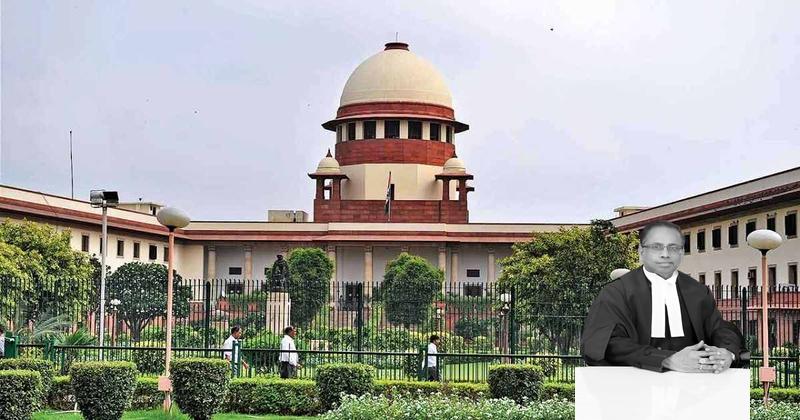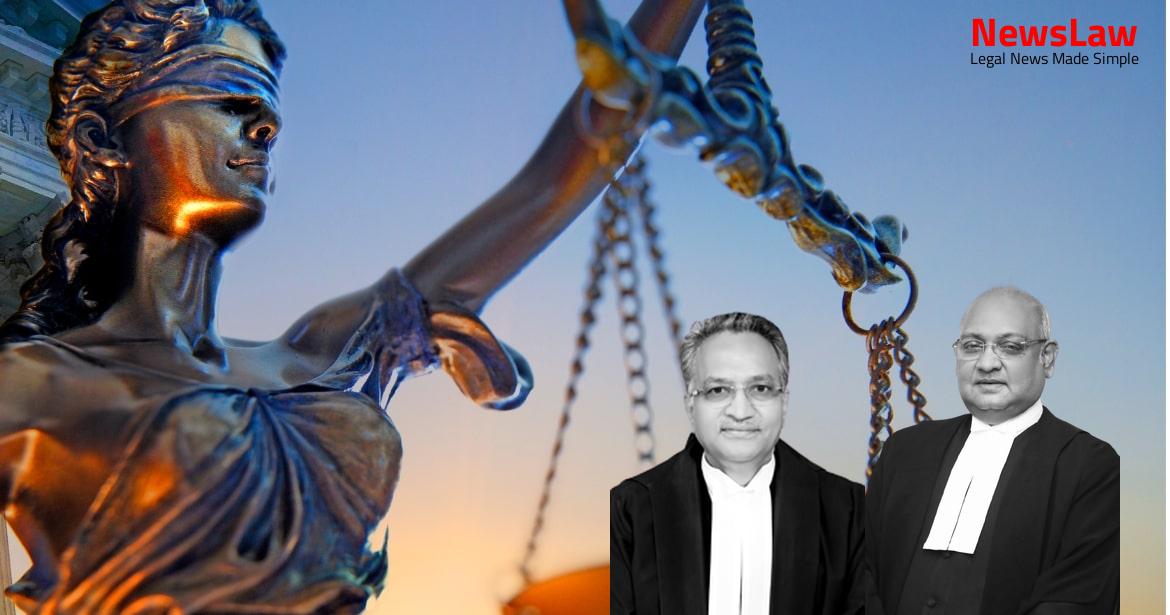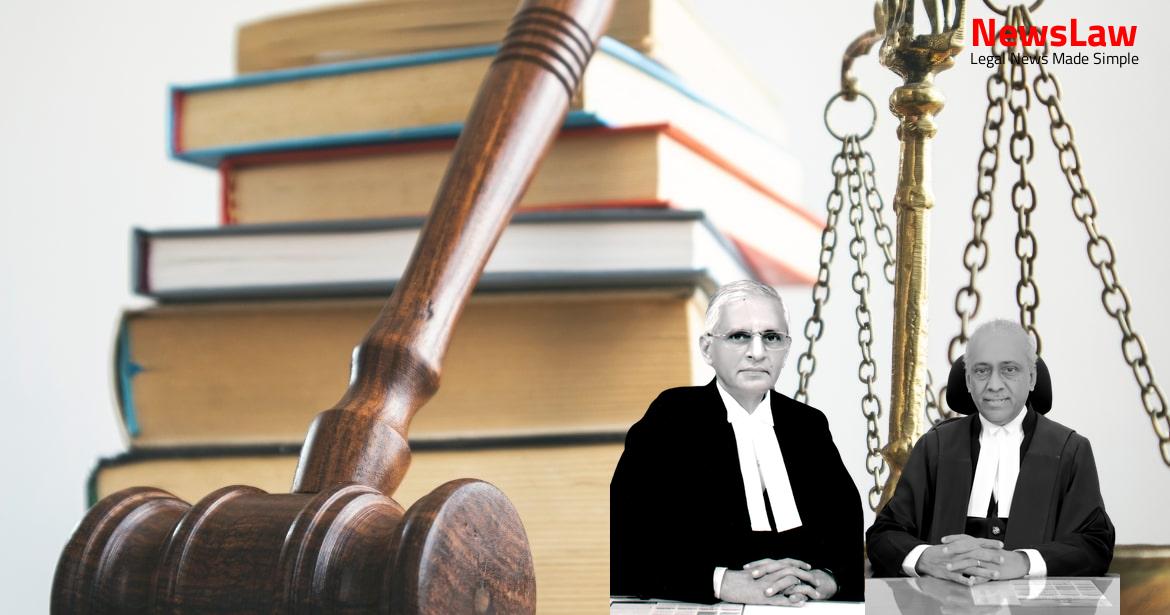Feeling aggrieved and dissatisfied with the impugned judgment and order passed by the High Court for the State of Telangana at Hyderabad in ARBA No 151 of 2016 by which the High Court has dismissed the said application filed under Section 11 of the Arbitration Act, 1996 (hereinafter referred to as “Act, 1996”) and has 42 1 refused to appoint an arbitrator on the ground that earlier the appellant had accepted the amount as per the final bill in full and final settlement and without raising any dispute and also signed and issued “no further claim certificate”, the original applicant has preferred the present appeal. However, it was the case on behalf of the appellant that in view of the Arbitration and Conciliation (Amendment) Act, 2015 (hereinafter referred to as “Amendment Act, 2015”) by which Section 11(6A) came to be inserted, while deciding the application under Section 11(6), the Court would have a very limited jurisdiction and to consider only whether there is an existence of the arbitration agreement or not and no further inquiry is permissible at the stage of deciding the application under Section 11(6) and the issue with respect to the “accord and satisfaction” has to be left to be decided by the arbitrator / arbitral tribunal.
4 By the impugned judgment and order, the High Court has dismissed the arbitration petition and has refused to appoint the arbitrator / arbitral tribunal on the ground that the Amendment Act, 2015 shall not be applicable and the Act, pre-amendment, 2015, shall be applicable. 1 it is submitted by Shri Parameshwar, learned counsel appearing on behalf of the appellant that the issue that arises for consideration in the present appeal is the interpretation of Section 26 of the Amendment Act, 4 42 2015 insofar as the applicability of the amended provisions, more specifically, insertion of Section 11(6A) and its applicability to judicial proceedings initiated after the Amendment Act, 2015 came into force w.e.f. 3
Relying upon the aforesaid decision, it is submitted that in the said decision it is specifically observed and held by this Court that the Amendment Act, 2015 shall be applicable prospectively and that even in a case where the arbitration proceedings were initiated as per Section 21 of the Act, prior to the Amendment Act, 2015, the Amendment Act, 2015 shall be applicable. Also, the reference to Section 21 of the 1996 Act, which appears in Chapter V, and which speaks of the arbitral proceedings commencing on the date on which a request for a dispute to be referred to arbitration is received by the respondent, would also make it clear that it is these proceedings, and no others, that form the subject-matter of the first part of Section 26. ( v ) A statute which not only changes the procedure but also creates new rights and liabilities shall be construed to be prospective in operation, unless otherwise provided, either expressly or by necessary implication.” It is, inter alia, because timelines for the making of an arbitral award have been laid down for the first time in Section 29-A of the Amendment ( sic Amended) Act that parties were given the option to adopt such timelines which, though procedural in nature, create new obligations in respect of a proceeding already begun under the unamended Act.
Whereas the first part refers only to arbitral proceedings before an Arbitral Tribunal, the second part refers to court proceedings “in relation to” arbitral proceedings, and it is the commencement of these court proceedings that is referred to in the second part of Section 26, as the words “in relation to the arbitral proceedings” in the second part are not controlled by the application of Section 21 of the 1996 Act. If the first part of Section 26 were couched in positive language (like the second part), it would have been necessary to add a proviso stating that the Amendment Act would apply even to arbitral proceedings commenced before the amendment if the parties agree. It is submitted that in such circumstances, the relevant date so far as the applicability of Section 11(6A) is concerned, is not the date of invocation of arbitration but the date of commencement of judicial proceedings before a court under Section 11. Pradeep Vinod Construction Company, (2020) 2 SCC 464 (Three Judge Bench), which also did not refer to the case of BCCI (supra) but has only followed the judgment in Parmar Construction Company (supra).
It is submitted that the reliance placed on Aravali Power Company Private Limited (supra) in the case of Parmar 10 42 Construction Company (supra) is completely misplaced. National Highways Authority of India (NHAI), (2019) 15 131 SCC (Para 19), has held that, 11 42 Section 34 as amended in 2015, will apply only to Section 34 applications that have been made to the Court on or after 23.10.2015, irrespective of the fact that the arbitration proceedings may have commenced prior to that date and while doing so, this Court followed the judgment in BCCI (supra).
Kochi Cricket (P) Ltd., (2018) 6 SCC] judgment will therefore continue to apply so as to make applicable the salutary amendments made by the 2015 Amendment Act to all court proceedings initiated after 23-10-2015.” 11 It is further submitted that the judgment in BCCI (supra), so far as it differentiated between arbitral proceedings and court proceedings, was followed in Government of India Vs. 13 In light of this brief conspectus of the aforesaid decisions, it is submitted that, the decision in BCCI 13 42 (supra), regarding judicial proceedings referred to in Section 26 not being controlled by Section 21 of the principal Act, has been followed by a coordinate bench of this Hon’ble Court in Ssangyong Engineering and Construction Company Limited (supra) and the three- judge benches in Hindustan Construction Company Limited and Anr. 14 It is therefore, the submission on behalf of the appellant that the decision of this Court in the case of 14 42 BCCI (supra) was binding on the coordinate bench which rendered the decision in the case of Parmar Construction Company (supra), this Court has not noticed the said decision and therefore, the decision in the case of Parmar Construction Company (supra) can be said to be per incuriam and/or sub silentio. 1
It is vehemently submitted by the learned counsel appearing on behalf of the respondents that as such the Hon’ble High Court has rightly dismissed the Section 11(6) application by observing and holding that the pre- amendment Arbitration Act, 2015 shall be applicable. It is submitted that therefore, considering Sections 34 and 36 proceedings as judicial/court proceedings, this Hon’ble Court has interpreted Section 26, bifurcating Section 26 into two 16 42 parts and to that it is observed and held that with respect to judicial proceedings under Sections 34 and 36, the Amendment Act, 2015 shall be applicable.
It is submitted that, however, on the other hand, there is a direct decision of this Hon’ble Court in the case of Parmar Construction Company (supra) dealing with the very issue of application under Section 11(6) of the Act, 1996 and in the said decision it is specifically observed and held that so far as the application under Section 11(6) of the Act, 1996 is concerned, in case the notice invoking the arbitration is invoked prior to the Amendment Act, 2015, pre Amendment Act, 2015 shall be applicable. 6 It is submitted that the reliance by the appellant on the expression “court proceedings in relation thereto” as it occurs in Section 26 of the Amendment Act, 2015 to contend that applications under Section 11 of the Act, 1996 would fall in such category is misplaced. It is submitted that it must be borne in mind that this Hon’ble Court was called upon to interpret Section 26 of the 18 42 Amendment Act, 2015, to answer as to whether applications under Section 36, which was amended by the Amendment Act, 2015 would apply in its amended form in respect of Section 34/36 proceedings initiated before the commencement of the Amendment Act, 2015. Meja Urja Nigam (P) Ltd., 2017 SCC OnLine Del 7808]; suffice it to note that as per Section 26 of the Arbitration and Conciliation (Amendment) Act, 2015, the provisions of the amended 2015 Act shall not apply to the arbitral proceedings commenced in accordance with the provisions of Section 21 of the principal Act before the commencement of the Amendment Act unless the parties otherwise agree.
[(2018) 6 SCC 287], this Court has held that the provisions of the Amendment Act, 2015 (with effect from 23-10-2015) cannot have retrospective operation in the arbitral proceedings already commenced unless the parties otherwise agree and held as under :……………….” 4.9 It is submitted that it is a settled law that arbitration commences upon invocation of the notice as per Section 21 of the Act, 1996. The short question which is posed for the consideration of this Court is, in relation to the arbitration proceedings, in a case where the notice invoking arbitration is issued prior to the Amendment Act, 2015, the old Act shall be applicable (pre-amendment 2015) or the new Act? Act not to apply to pending arbitral proceedings – Nothing contained in this Act shall apply to the arbitral proceedings commenced, in accordance with the provisions of Section 21 of the principal Act, before the commencement of this Act unless the parties otherwise agree but this Act shall apply in relation to arbitral proceedings commenced on or after the date of commencement of this Act.” However, Section 26 of the Amendment Act, 2015 provides that nothing contained in this Act shall apply to the arbitral proceedings commenced, in accordance with the provisions of Section 21 of the principal Act, before the 23 42 commencement of this Act unless the parties otherwise agree.
Therefore, as per section 21 of the principal Act the arbitral proceedings can be said to have commenced on the date on which a request for the dispute to be referred to the arbitration is received by the respondent. So far as the second part of Section 26 is concerned, namely, the part which reads, “… but this Act shall apply in relation to arbitral proceedings commenced on or after the date of commencement of this Act” makes it clear that the expression “in relation to” is used; and the expression “the” arbitral proceedings and “in accordance with the provisions of Section 21 of the principal Act” is conspicuous by its absence. That the expression “the arbitral proceedings” refers to proceedings before an Arbitral Tribunal is clear from the heading of Chapter V of the 1996 Act, which reads as follows: “Conduct of arbitral proceedings” The entire chapter consists of Sections 18 to 27 dealing with the conduct of arbitral proceedings before an Arbitral Tribunal. ( v ) A statute which not only changes the procedure but also creates new rights and liabilities shall be construed to be prospective in operation, unless otherwise provided, either expressly or by necessary implication.” It is, inter alia, because timelines for the making of an arbitral award have been laid down for the first time in Section 29-A of the Amendment ( sic Amended) Act that parties were given the option to adopt such timelines which, though procedural in nature, create new obligations in respect of a proceeding already begun under the unamended Act.
Whereas the first part refers only to arbitral proceedings before an Arbitral Tribunal, the second part refers to court proceedings “in relation to” arbitral proceedings, and it is the commencement of these court proceedings that is referred to in the second part of Section 26, as the words “in relation to the arbitral proceedings” in the second part are not controlled by the application of Section 21 of the 1996 Act. If the first part of Section 26 were couched in positive language (like the second part), it would have been necessary to add a proviso stating that the Amendment Act would apply even to arbitral proceedings commenced before the amendment if the parties agree. However, it is required to be noted that in the case of BCCI (supra), this Court was considering the proceedings under sections 34 and 36 of the Amendment Act, 2015 and to that while interpreting section 26, it is observed that the Amendment Act is prospective in nature, and will apply even to those arbitral proceedings that are commenced, as understood by section 21 of the principal Act, prior to the Amendment Act, and to Court proceedings which have commenced on or after the Amendment Act came into force.
Section 21 of the 1996 Act clearly envisages that unless otherwise agreed by the parties, the arbitral proceedings in respect of a dispute shall commence from the date on which a request for that dispute to be referred to arbitration is received by the respondent and the plain reading of Section 26 of the 2015 Amendment Act is self-explicit, leaves no room for interpretation.
Act not to apply to pending arbitral proceedings.—Nothing contained in this Act shall apply to the arbitral proceedings commenced, in accordance with the provisions of Section 21 of the principal Act, before the commencement of this Act unless the parties otherwise agree but this Act shall apply in relation to arbitral proceedings commenced on or after the date of commencement of this Act.”
(2017) 15 SCC 32 : (2018) 2 SCC (Civ) 642] and taking note of Section 26 of the 2015 Amendment Act laid down the broad principles as under : (SCC p. In cases governed by the 1996 Act as it stood before the Amendment Act came into force: 22.1.1. While exercising such power under sub-section (6) of Section 11, if 32 42 circumstances exist, giving rise to justifiable doubts as to the independence and impartiality of the person nominated, or if other circumstances warrant appointment of an independent arbitrator by ignoring the procedure prescribed, the Chief Justice or his designate may, for reasons to be recorded ignore the designated arbitrator and appoint someone else. Considering the facts and circumstances of the present case, we are not inclined to go into the merits of this contention of the appellant nor examine the correctness or otherwise of 33 42 the above view taken by the Delhi High Court in Ratna Infrastructure Projects case [ Ratna Infrastructure Projects (P) Ltd.
Suffice it to note that as per Section 26 of the Arbitration and Conciliation (Amendment) Act, 2015, the provisions of the amended 2015 Act shall not apply to the arbitral proceedings commenced in accordance with the provisions of Section 21 of the principal Act before the commencement of the Amendment Act unless the parties otherwise agree. In our considered view, the applications/requests made by the respondent contractors deserve to be examined in accordance with the principal Act, 1996 without taking resort to the 2015 Amendment Act which came into force from 23-10-2015.” In the said case, a three Judge Bench of this Court has 35 42 followed the decision in the case of Parmar Construction Company (supra) and in the said decision it is specifically observed that unamended 1996 Act, i.e., prior to Amendment Act, 2015 for appointment of arbitrator shall be applicable where the request to refer the dispute to arbitration was made before 2015 amendment came into effect. It is the case on behalf of the appellant that therefore in the case of BCCI (supra), the decision which has been subsequently followed in the case of Ssangyong Engg. It is also the case on behalf of the appellant that so far as the decision in the case of Aravali Power Company Private Limited (supra), which was considered by this Court in the case of Parmar Constructions Company (supra) is concerned, in the said decision also, there is no reference to the decision in the case of BCCI (supra). However, on a fair reading of the decisions in the case of BCCI (supra) and the observations made in paragraphs 37 to 39 and on a fair reading of decisions in the cases of Parmar Constructions Company (supra) and Pardeep Vinod Construction Company (supra), we are of the opinion that this Court in the case of BCCI (supra) has held that the Arbitration Amendment Act, 2015 is prospective in 38 42 nature insofar as the proceedings under sections 34 & 36 are concerned.
In the case of Parmar Constructions Company (supra), it is specifically observed and held that in a case where notice invoking arbitration is issued prior to Amendment Act, 2015 and the application under section 11(6) is filed post amendment, as per section 21 of the principal Act, the date of issuance of the notice invoking arbitration shall be considered as commencement of the arbitration proceedings and therefore as per section 26 of the Amendment Act, 2015, the Amended Act, 2015 shall not be applicable and the parties shall be governed by the pre-amendment Act, 2015. Therefore, any observations made by this Court in paragraphs 37 to 39 in the case of BCCI (supra) shall be understood and construed with respect to court proceedings which have commenced on or after the Amendment Act coming into force, namely, the proceedings under sections 34 & 36. Singla Constructions Private Limited (supra) to the facts of the case on hand as in the present case the notice invoking arbitration clause was issued on 26.12.2013, i.e., much prior to the Amendment Act, 2015 and the application under Section 11(6) of the Act has been preferred/filed on 27.04.2016, i.e., much after the amendment Act came into force, the law prevailing prior to the Amendment Act, 2015 shall be applicable and therefore the High Court has rightly entered into the question of accord and satisfaction and has rightly dismissed the application under section 11(6) of the Act applying the principal Act, namely, the Arbitration and Conciliation Act, 1996, prevailing prior to the Amendment 41 42 Act, 2015.
Case Title: M/S SHREE VISHNU CONSTRUCTIONS Vs. THE ENGINEER IN CHIEF MILITARY ENGINEERING SERVICE (2023 INSC 508)
Case Number: C.A. No.-003461-003461 / 2023



